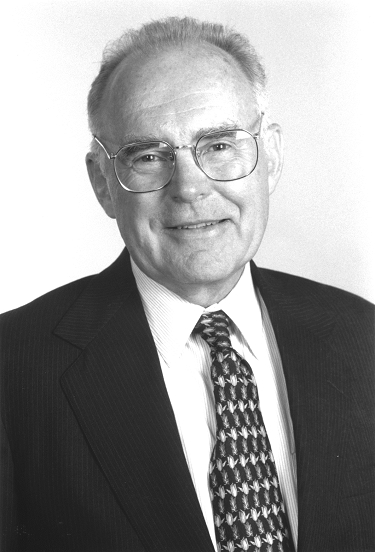Gordon E. Moore*
Class of 1996
- Chairman of the Board Intel Corporation

Opportunity knocks several times. Finding the one that is right for you is important.
Gordon Moore was born in 1929 in the farming community of Pescadero, near San Francisco. His father was the constable and the only law enforcement officer for half the county. Before holding that elected position, Moore's father drove teams of horses hauling lumber. He was a hardworking man who was forced to end his formal education in the eighth grade to help support his family.
Moore describes his life in those days as simple and value-oriented. The family owned a cow, and it was Moore's job each day to milk it and separate the cream. At the age of 10, he took a job selling magazines door to door, but he did not do well in this position, and it became the only job from which he was ever fired.
Fascinated with a chemistry set he received as a gift, Moore often conducted experiments from his backyard shed. In high school, he worked summers in a cement plant and held that job through his first two years of college at San Jose State University. He transferred during his junior year to the University of California at Berkeley, where he was able to rent a room for $15 a month. He paid for that by working as a dishwasher. He went on to earn his doctorate in chemistry at the California Institute of Technology.
Moore did research for Johns Hopkins University in Maryland, where he met Dr. William Shockley, the Nobel Prize winner and co-inventor of the transistor. In 1956, Moore joined the new Shockley Semiconductor Laboratory in San Jose. Later, he formed his own company, Fairchild Semiconductor, where he headed the engineering department. The work done there became the basis for the integrated circuit. In 1968, Moore and his partner, Robert N. Noyce, left Fairchild to start Intel Corporation.
Initially, Moore served as Intel's executive vice president until 1975, when he became president. In 1979, Moore became chairman and CEO, holding that position until 1987. He was named chairman emeritus in 1997. In 1990, President George H. W. Bush presented Moore with the National Medal of Technology.
Intel pioneered integrated electronics technology, which made the information revolution possible. Its major breakthroughs include large-scale integrated memory and the microwave processor. "I was in the right place at the right time," says Moore. "But you have to take advantage of opportunities that present themselves."